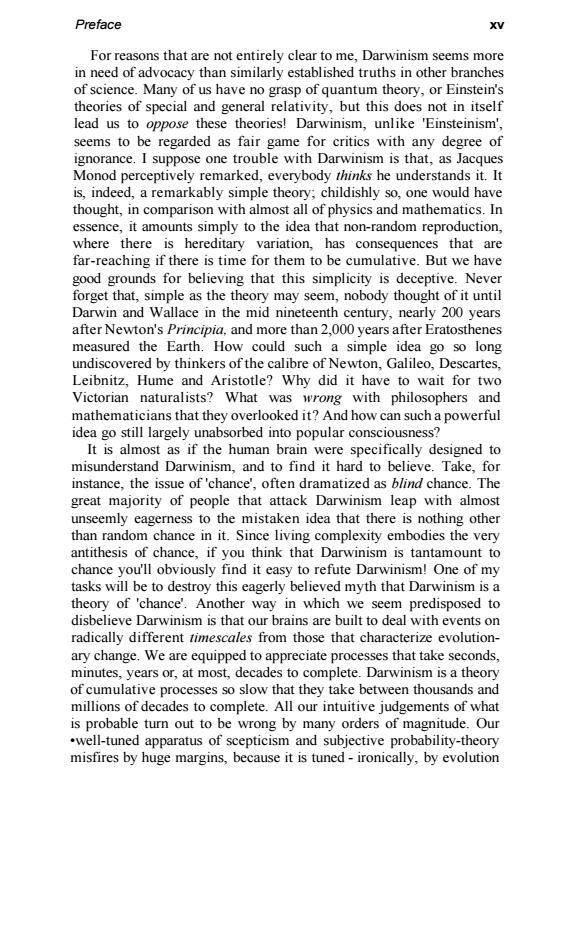正在加载图片...

Preface XV For reasons that are not entirely clear to me,Darwinism seems more in need of advocacy than similarly established truths in other branches of science.Many of us have no grasp of quantum theory,or Einstein's theories of special and general relativity,but this does not in itself lead us to oppose these theories!Darwinism,unlike 'Einsteinism', seems to be regarded as fair game for critics with any degree of ignorance.I suppose one trouble with Darwinism is that,as Jacques Monod perceptively remarked,everybody thinks he understands it.It is,indeed,a remarkably simple theory;childishly so,one would have thought,in comparison with almost all of physics and mathematics.In essence,it amounts simply to the idea that non-random reproduction, where there is hereditary variation,has consequences that are far-reaching if there is time for them to be cumulative.But we have good grounds for believing that this simplicity is deceptive.Never forget that,simple as the theory may seem,nobody thought of it until Darwin and Wallace in the mid nineteenth century,nearly 200 years after Newton's Principia,and more than 2,000 years after Eratosthenes measured the Earth.How could such a simple idea go so long undiscovered by thinkers of the calibre of Newton,Galileo,Descartes, Leibnitz,Hume and Aristotle?Why did it have to wait for two Victorian naturalists?What was wrong with philosophers and mathematicians that they overlooked it?And how can such a powerful idea go still largely unabsorbed into popular consciousness? It is almost as if the human brain were specifically designed to misunderstand Darwinism,and to find it hard to believe.Take,for instance,the issue of 'chance',often dramatized as blind chance.The great majority of people that attack Darwinism leap with almost unseemly eagerness to the mistaken idea that there is nothing other than random chance in it.Since living complexity embodies the very antithesis of chance,if you think that Darwinism is tantamount to chance you'll obviously find it easy to refute Darwinism!One of my tasks will be to destroy this eagerly believed myth that Darwinism is a theory of 'chance'.Another way in which we seem predisposed to disbelieve Darwinism is that our brains are built to deal with events on radically different timescales from those that characterize evolution- ary change.We are equipped to appreciate processes that take seconds, minutes,years or,at most,decades to complete.Darwinism is a theory of cumulative processes so slow that they take between thousands and millions of decades to complete.All our intuitive judgements of what is probable turn out to be wrong by many orders of magnitude.Our .well-tuned apparatus of scepticism and subjective probability-theory misfires by huge margins,because it is tuned-ironically,by evolutionPreface xv For reasons that are not entirely clear to me, Darwinism seems more in need of advocacy than similarly established truths in other branches of science. Many of us have no grasp of quantum theory, or Einstein's theories of special and general relativity, but this does not in itself lead us to oppose these theories! Darwinism, unlike 'Einsteinism', seems to be regarded as fair game for critics with any degree of ignorance. I suppose one trouble with Darwinism is that, as Jacques Monod perceptively remarked, everybody thinks he understands it. It is, indeed, a remarkably simple theory; childishly so, one would have thought, in comparison with almost all of physics and mathematics. In essence, it amounts simply to the idea that non-random reproduction, where there is hereditary variation, has consequences that are far-reaching if there is time for them to be cumulative. But we have good grounds for believing that this simplicity is deceptive. Never forget that, simple as the theory may seem, nobody thought of it until Darwin and Wallace in the mid nineteenth century, nearly 200 years after Newton's Principia, and more than 2,000 years after Eratosthenes measured the Earth. How could such a simple idea go so long undiscovered by thinkers of the calibre of Newton, Galileo, Descartes, Leibnitz, Hume and Aristotle? Why did it have to wait for two Victorian naturalists? What was wrong with philosophers and mathematicians that they overlooked it? And how can such a powerful idea go still largely unabsorbed into popular consciousness? It is almost as if the human brain were specifically designed to misunderstand Darwinism, and to find it hard to believe. Take, for instance, the issue of 'chance', often dramatized as blind chance. The great majority of people that attack Darwinism leap with almost unseemly eagerness to the mistaken idea that there is nothing other than random chance in it. Since living complexity embodies the very antithesis of chance, if you think that Darwinism is tantamount to chance you'll obviously find it easy to refute Darwinism! One of my tasks will be to destroy this eagerly believed myth that Darwinism is a theory of 'chance'. Another way in which we seem predisposed to disbelieve Darwinism is that our brains are built to deal with events on radically different timescales from those that characterize evolutionary change. We are equipped to appreciate processes that take seconds, minutes, years or, at most, decades to complete. Darwinism is a theory of cumulative processes so slow that they take between thousands and millions of decades to complete. All our intuitive judgements of what is probable turn out to be wrong by many orders of magnitude. Our •well-tuned apparatus of scepticism and subjective probability-theory misfires by huge margins, because it is tuned - ironically, by evolution